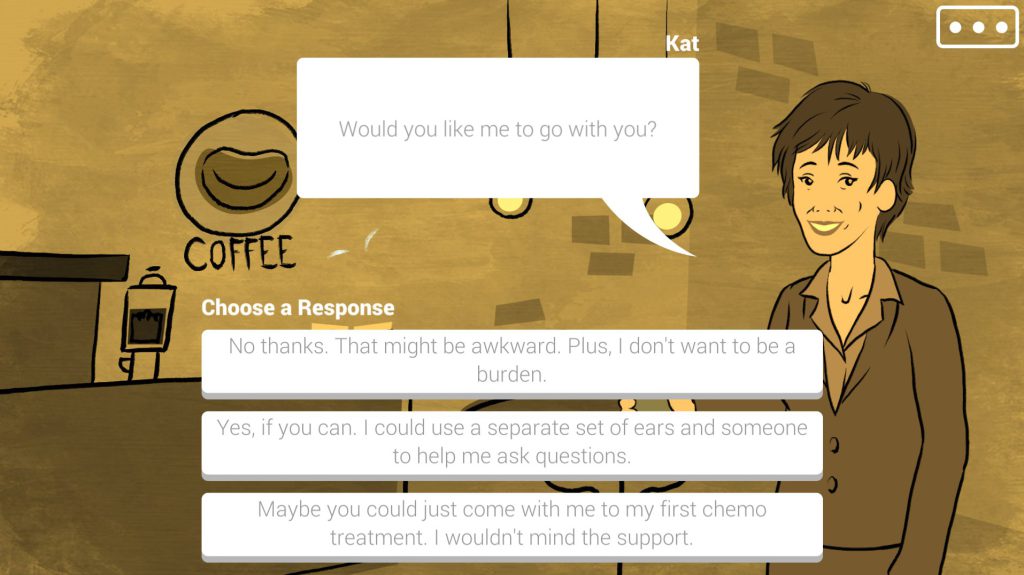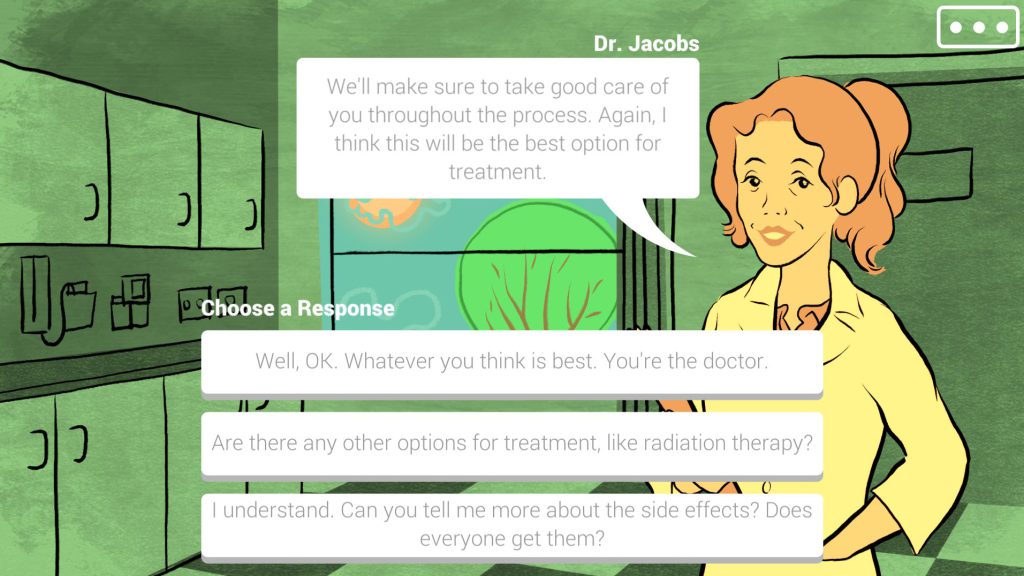Meet Angela, a single mom in her late 30s who works at a local coffee shop. She’s recently been diagnosed with stage 4 cancer, and she has an appointment tomorrow with her oncologist to discuss treatment options.
Angela often finds it hard to ask for help, but her friend Kat has offered to go with her to the appointment tomorrow. It would be nice to have support and another set of ears to process the flood of information. But on the other hand, it might be awkward and a burden for Kat.
How should Angela respond?
This is the kind of scenario that users will encounter in Strong Together, a so-called serious game that researchers at the University of Pittsburgh are developing as an app to help women with advanced breast or gynecologic cancer gain self-advocacy skills to stand up for themselves and become more engaged in their cancer care.

Strong Together is a serious game that aims to help women with advanced breast or gynecologic cancers develop self advocacy skills (Credit: Simcoach Games).
“Particularly when you’re not feeling well, it can be really difficult to navigate the health care system and make complex decisions about your treatment,” said Dr. Teresa Hagan Thomas, assistant professor in the Pitt School of Nursing and investigator at UPMC Hillman Cancer Center. “We wanted to find a way to help women feel empowered to ask questions, understand what is happening and be involved in their treatment decisions from the very beginning of their advanced cancer diagnosis.”
Through a pilot study, the results of which were published in a recent issue of the journal Cancer, Thomas and her team found preliminary evidence that Strong Together enhanced self-advocacy skills and improved quality of life. They also showed that participants found the game acceptable and that the study approach was feasible, setting the stage for a larger clinical trial.
Developed in collaboration with patients and patient advocates, Strong Together follows three female characters of different ages and social situations who were recently diagnosed with advanced cancer. The game focuses on developing three self-advocacy skills: making informed decisions, communicating effectively with health care providers and building strength via connection to others.
“Strong Together is designed as a ‘choose your own adventure’ story,” explained Thomas. “It’s designed for women, who we know tend to like narrative, story-based games with character development. It’s not about ‘winning’ or getting the most points or stars.”
As the storylines progress, the characters run into difficult situations and common challenges, such as fatigue and other physical side effects, emotional distress, balancing work and social life, asking loved ones for help and financial issues. Users are asked to choose how the character should respond in these situations with the goal of keeping them healthy and strong.
“As the user makes these decisions, the storyline changes. If the characters advocate for themselves and effectively manage issues that arise, their quality of life and physical health improves, and that’s reflected in the game with upbeat music and a vibrant color scheme,” said Thomas. “If the characters don’t advocate for themselves, quality of life and health decline, the colors become more muted, and the music is a little bit somber to reinforce the message.”

In Strong Together, users make decisions on behalf of characters to keep them healthy and strong (Credit: Simcoach Games).
For the pilot trial, Thomas and her team recruited 78 women who were recently diagnosed with incurable breast or gynecologic cancer at UPMC Hillman Cancer Center. Fifty-two participants received a tablet loaded with the Strong Together game. They were encouraged with reminder emails to play at least once per week.
As a control group, 26 participants received enhanced usual care, which included a paper guide published by the National Coalition for Cancer Survivorship that outlines some of the same topics covered in Strong Together.
The researchers found that recruitment and retention of women in the study exceeded expectations: About 85% of participants remained after six months, a noteworthy result because advanced cancer patients are often reluctant to join clinical trials or drop out early.
“A lot of interventions require in-person meetings and can be very time-consuming,” said Thomas. “Our goal with Strong Together was to build something that was very accessible and easy to use that women could do at their own pace and from the comfort of their own home.”
Participants provided feedback about their experience through surveys and exit interviews. About 92% reported that they were satisfied overall with the game.
“Women told us that they saw themselves in these characters and had similar struggles and questions,” said Thomas. “The biggest takeaway was that this is something women were looking for. They knew they should be self-advocating, but they needed the language and confidence to put it into action.”
Women in the Strong Together group showed improvements in self-advocacy and less severe declines in quality of life after six months compared to those in the control group.
Thomas and her team are now enrolling more than 300 women in a larger clinical trial to confirm these encouraging findings. They also want to delve deeper into the mechanisms behind why serious games are effective.
“If serious games work, what is it about them that makes them work? Right now, it’s a black box,” said Thomas. “We want to understand which parts of the game lead to people being more engaged.”
For more information about the STRONG trial, please visit the website.
Journalists interested in learning more can contact mediarelations@upmc.edu









